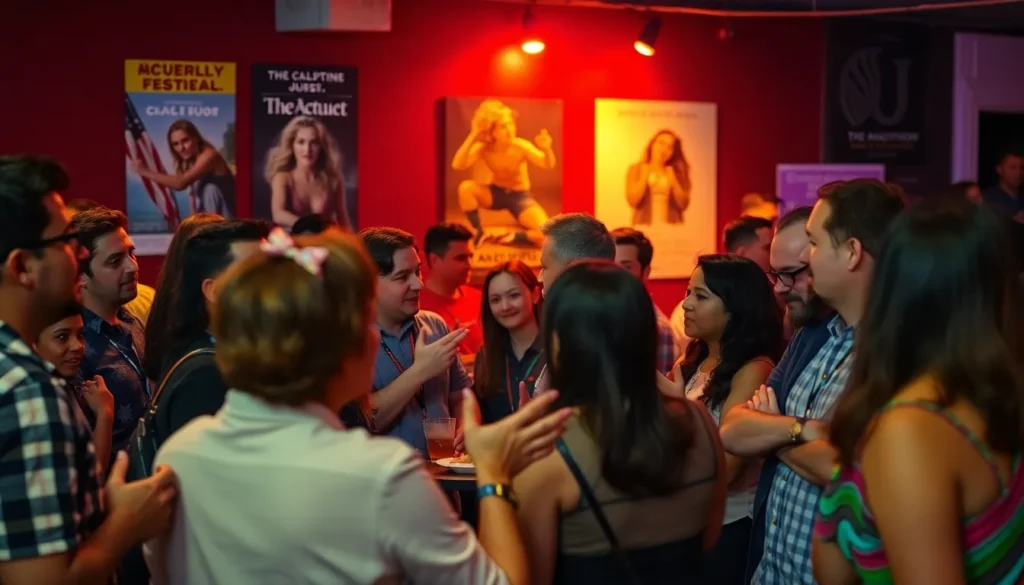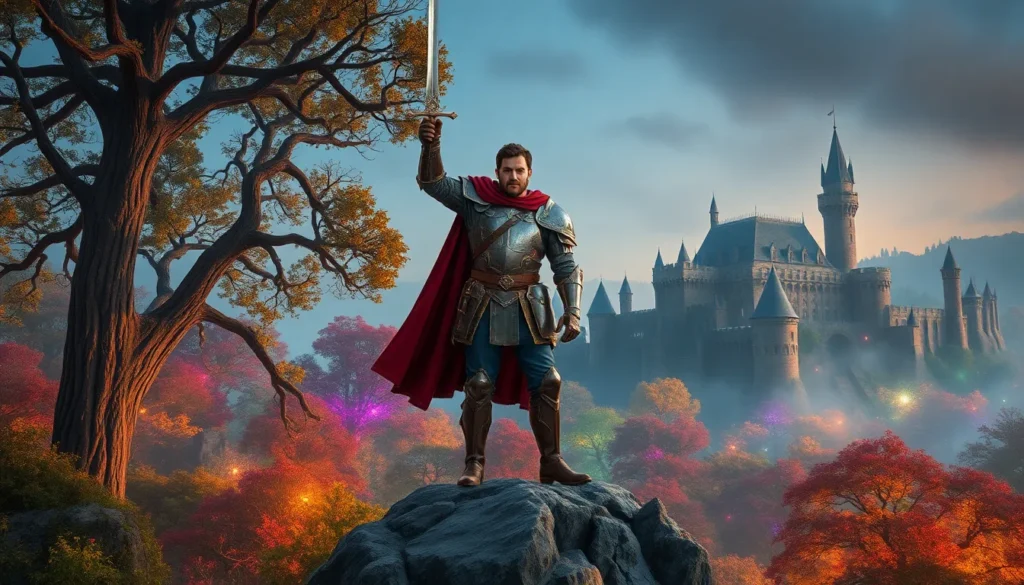Table of Contents
ToggleIn the vibrant world of indie cinema, few films spark as much discussion as “Chasing Amy.” But what happens when you throw in a twist of Outfest magic? This unique event celebrates LGBTQ+ storytelling, and with “Chasing Chasing Amy,” it dives deep into the film’s cultural impact and the complexities of love and identity.
Overview of Chasing Chasing Amy
“Chasing Chasing Amy” serves as a documentary that dives deep into the legacy of the 1997 film “Chasing Amy.” This documentary showcases interviews with cast members, crew, and fans, all providing varied perspectives on the impact the film has had. It addresses themes such as love, sexual identity, and the complexities surrounding relationships in the LGBTQ+ community.
The event “Chasing Chasing Amy,” hosted at Outfest, emphasizes the importance of this film in indie cinema history. A notable aspect includes discussions about the challenges faced by the LGBTQ+ community when portraying authentic narratives. Discussions not only reflect on the film’s narrative but also how it resonates with contemporary audiences. Artistry in “Chasing Amy” is examined through the lens of its cultural significance, provoking ongoing conversations about gender and sexuality.
Over time, “Chasing Chasing Amy” has gained recognition as a crucial exploration of how media shapes societal understanding. Various historians and film critics contribute insights on the dynamics in the film, showcasing its relevance in today’s context. Themes of acceptance and the quest for identity are universally relatable, allowing for diverse interpretations. Events such as Outfest help to amplify these discussions, ensuring that new generations engage with these important topics.
“Chasing Chasing Amy” enables filmmakers and viewers alike to reflect on their own experiences with love and identity. Perspectives shared during the event reveal how the film continues to inspire both storytellers and audiences. This exploration underscores the lasting significance of “Chasing Amy” in shaping conversations surrounding LGBTQ+ art and culture.
Film Synopsis

“Chasing Amy” intertwines relationships and identity within the LGBTQ+ community. The narrative follows the lives of its main characters, navigating love and personal struggles.
Main Characters
Ben Affleck portrays Holden McNeil, a comic book artist who grapples with love and acceptance. His best friend, Banky Edwards, played by Jason Lee, offers comedic relief and heartfelt support. Joey Lauren Adams shines as Alyssa Jones, the center of Holden’s affection. Her complex backstory adds depth to the narrative. Together, these characters explore the intricacies of same-sex relationships, friendship, and the search for individual identity.
Key Themes
Love features as a dominant theme, depicted through Holden’s pursuit of Alyssa. Sexual identity serves as another critical aspect, addressing the fluidity and complexity within relationships. Vulnerability reveals itself in moments of conflict and reconciliation among friends. The film challenges traditional norms, prompting discussions on acceptance and societal perceptions. Artistic expression emerges as well, reflecting personal journeys through the medium of comic books and storytelling. Ultimately, these themes resonate universally, fostering connections across diverse audiences.
Outfest’s Role in the Film’s Context
Outfest plays a significant role in celebrating LGBTQ+ narratives within film. It provides a platform for diverse voices and stories, contributing to the ongoing dialogue about identity and representation.
History of Outfest
Founded in 1982, Outfest started as a small event. Over the years, it transformed into a premier film festival dedicated to LGBTQ+ cinema. The festival now attracts audiences from around the world, showcasing over 200 films each year. Recognized with numerous awards, it highlights the importance of LGBTQ+ representation in media. Outfest’s commitment to cultural inclusion has made it a vital advocate for independent filmmakers and their stories.
Support for LGBTQ+ Cinema
Outfest actively supports the development of LGBTQ+ cinema through various initiatives. It offers grants and mentorship programs for emerging filmmakers. These resources empower creators to tell authentic stories that resonate with the community. Events like “Chasing Chasing Amy” foster discussions about landmark films and their impact. The organization encourages collaboration among artists, allowing diverse perspectives to shape the future of LGBTQ+ storytelling. Reaching wider audiences has become essential for ensuring these narratives persist in mainstream discourse.
Reception and Impact
“Chasing Amy” received substantial acclaim since its release. The film garnered attention for its bold exploration of complex themes, resonating with audiences and critics alike.
Critical Acclaim
Critics praised “Chasing Amy” for its raw and honest portrayal of sexual identity. The film’s dialogue and character development stood out, earning it a place among essential indie films. Several reviewers noted its groundbreaking approach to LGBTQ+ narratives in the late 1990s. Additionally, Kevin Smith’s writing and direction showcased a unique blend of humor and poignancy. Awards recognition further cemented its legacy, illustrating its significant impact on cinema.
Audience Reactions
Audience reactions highlighted deep connections to the characters’ experiences. Viewers often shared personal stories about love and identity in response to the film. Engaging discussions emerged among different demographics, reflecting diverse interpretations of its themes. Many fans found the film relatable, contributing to its cult status over the years. Events like “Chasing Chasing Amy” further fueled conversations, allowing attendees to express their thoughts on the film’s lasting influence.
Cultural Significance
“Chasing Amy” transformed the landscape of indie cinema, particularly regarding LGBTQ+ narratives. Its exploration of love and identity resonates deeply within the community, making it a pivotal work. The documentary “Chasing Chasing Amy” highlights these themes, showcasing interviews with cast, crew, and fans who reflect on the film’s enduring impact. Viewers gain insights into how the film challenged societal norms and portrayed authentic relationships.
Outfest’s hosting of this event emphasizes the festival’s commitment to celebrating LGBTQ+ stories. Founded in 1982, Outfest remains a key player in promoting cultural inclusion, advocating for diverse narratives. Each year, it showcases over 200 films, spotlighting emerging filmmakers and their contributions to the cinema landscape. Through grants and mentorship programs, it empowers creators to tell their unique stories.
Critics have touted “Chasing Amy” for its honest portrayal of sexual identity since its 1997 release. Dialogue crafted by Kevin Smith resonates with audiences, blending humor with poignant moments. The film’s acclaim further solidifies its status as a cornerstone of indie film. Personal reflections from viewers illustrate the strong connections formed with the characters, enriching discussions around identity and love.
Both “Chasing Amy” and “Chasing Chasing Amy” foster a unified exploration of acceptance. Conversations sparked by these films enable attendees to engage with their own experiences. Through shared narratives, they help elucidate the complexities of LGBTQ+ identity. Such dialogues reaffirm the significance of these works in shaping societal understanding and expanding the reach of LGBTQ+ narratives.
“Chasing Chasing Amy” stands as a testament to the enduring legacy of “Chasing Amy” in the realm of indie cinema. By highlighting the film’s exploration of love and identity, it invites audiences to reflect on their own experiences and the complexities of relationships within the LGBTQ+ community.
Events like this not only celebrate groundbreaking narratives but also encourage ongoing dialogue about acceptance and representation. As filmmakers continue to draw inspiration from such pivotal works, the conversation around LGBTQ+ stories remains vibrant and necessary. The impact of these films extends beyond their initial release, shaping cultural perceptions and fostering connections among diverse audiences.




